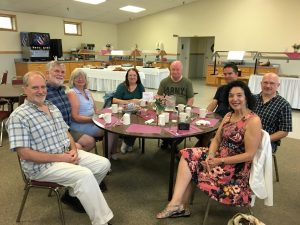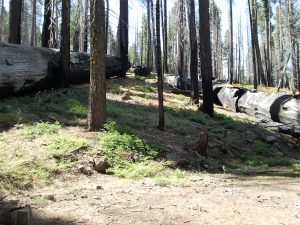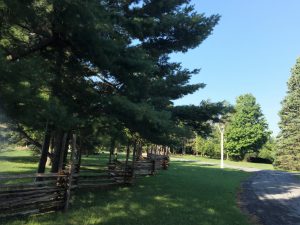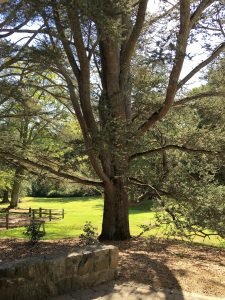 2 Timothy 3:10
2 Timothy 3:10
You, however, have followed my teaching, my conduct, my aim in life, my faith, my patience, my love, my steadfastness… (ESV).
Last week we thought about following bad examples (models, patterns). In our text from this week’s Bible reading, we read of a good example to follow. (A gentle nudge: please join us in our weekly Bible readings. Replace a half hour of television each day with the Holy Scriptures.) You will notice the dots above at the end of verse. Paul went on to talk about his example of suffering persecution, but addressing that now would make this article rather long. Let’s concentrate on the parts of his good example to Timothy and others listed above.
Every believer in God in this new covenant age is, of necessity, a follower of the Lord Jesus Christ. Jesus said to him, “I am the way, and the truth, and the life. No one comes to the Father except through me” (John 14:6 ESV). Other verses make the same point. But as I have written other times, the Lord also provides other people to be good models for us. For this reason, Paul did not hesitate to affirm Timothy in following him, because Paul followed Christ. Timothy had rejected the evil examples of most people who live in the last days (3:1-9). Notice this. Timothy had been a faithful co-worker in the gospel for many years, since the early days of Paul’s second missionary journey. Yet Paul did not hesitate to encourage his friend. Life in the difficult times of the last days (3:1) requires us to build up and to encourage each other. Paul did not hesitate to encourage a minister of the gospel, which Timothy was. Well-meaning believers wrongly suppose that they encourage the minister in their local church or the leader of their small group by saying, “That was a nice message or good lesson!” That is part of the wrong thinking that pervades “edifice” or “institutional” churches. Fellowship (sharing of life) requires much more than saying pleasant phrases to each other, however kind the intent. Every believer needs to be encouraged in the ways of the Lord. We all need to be in small groups in order to share life and not mere clichés.
Paul commends Timothy for seven ways he followed him. Notice the repeated “my” that lays emphasis on each item he mentions. Each part is essential to the whole. The Christian way of life is not cafeteria or buffet style. It is comprehensive, which accounts for some of its difficulty and need for the Spirit’s power. It is relatively easy to persuade someone to make a few changes to his/her way of life where they recognize the need for change. But minimal, selective change is insufficient. Such a person lacks understanding of what it means to follow Christ. Our Lord never says, “Pick a few items off this list that you feel you like or might be able to accomplish.” He demands that we follow him completely and from the heart. If you have halted in your growth in grace, it is not because you think what Christ is too hard. In fact, you have underestimated its difficulty. It is impossible (cf. John 15:5). You need to draw fresh strength from the Lord to follow him in every area. We’ll start with comments of the first two ways.
- “My teaching” – The necessity of sound teaching is disregarded in our time. Many want what is inspirational, exciting, stern, humorous, chic, cutting-edge, traditional, or mysteriously spiritual (“it felt like God was there”). What each of the preceding doesn’t want is teaching that challenges and changes the way they think! It is part of the anti-God way of “the flesh”, which hates God’s words. There is far too much love of the opinions of the world. Paul’s teaching was built on and around the truth of the Lord Jesus Christ and the gospel (good news). Timothy grasped this and his thinking was transformed by the truth of Jesus and the gospel. God changes us as the Holy Spirit takes the teaching of Jesus and the apostles and uses it by his power to change the thoughts and ideas and attitudes of our hearts. Apart from this change, we easily drift back into our former ways. We must have teaching, not to accumulate information, but to develop practically the ways of Christ’s new kingdom in us. His teaching builds Christ-like character as we learn from him.
- “My conduct” – The Greek word used occurs only here in the New Testament Scriptures. It has the idea of a kind of life or conduct that results from a particular upbringing. Paul was brought up in the gospel after his conversion and led by the Spirit to conduct himself in a gospel-formed way. Timothy followed Paul in that same upbringing. When we are “baby Christians”, we need to be brought up in new conduct. Yes, honest inquirer or new believer, a person’s conduct can change.
I often walk at Valley Forge Park. If I park my car in the parking lot nearest my house, the trail to the trails starts with a long, steep climb. It can look discouraging the first few times. But repeated walks help the walker to know that the trails are doable. Following Christ and the apostles and others following Christ might seem intimidating. But the Holy Spirit is the believer’s friend and uses these examples to transform us. Would you like to take a walk?
Grace and peace, David

 1 Samuel 16:1-13
1 Samuel 16:1-13 1 Thessalonians 5:11
1 Thessalonians 5:11 Psalm 10:1-11
Psalm 10:1-11 Psalm 10:1-11
Psalm 10:1-11 Genesis 26:7-11
Genesis 26:7-11 Genesis 26
Genesis 26 Psalm 9:13-20
Psalm 9:13-20